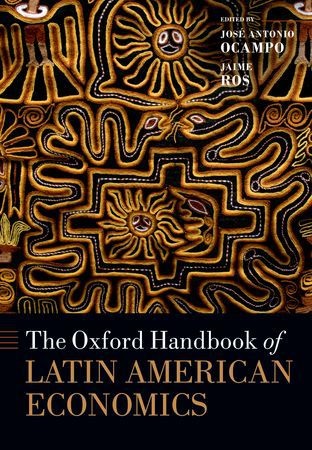Read more
Informationen zum Autor José Antonio Ocampo is Professor and Director of the Economic and Political Development Program at the School of International and Public Affairs (SIPA), and Member of the Committee on Global Thought, and Co-President of the Initiative for Policy Dialogue at Columbia University, New York. He is a former Under-Secretary-General of the United Nations for Economic and Social Affairs, Executive Secretary of the Economic Commission for Latin America and the Caribbean (ECLAC/CEPAL), and Minister of Finance of Colombia. ; Jaime Ros is Professor of Economics and Fellow of the Kellogg Institute for International Studies, University of Notre Dame. He is former Professor of Economics at the Centro de Investigación y Docencia Ecocómicas (CIDE), Mexico D.F. and Senior Economist at the Secretariat of the South Commission, Geneva. He has been a consultant for several international organizations and governments in Latin America. Klappentext A comprehensive overview of the key factors affecting the development of Latin American economies that examines long-term growth performance, macroeconomic issues, Latin American economies in the global context, technological and agricultural policies, and the evolution of labour markets, the education sector, and social security programmes. Zusammenfassung A comprehensive overview of the key factors affecting the development of Latin American economies that examines long-term growth performance, macroeconomic issues, Latin American economies in the global context, technological and agricultural policies, and the evolution of labour markets, the education sector, and social security programmes. Inhaltsverzeichnis Part I: Development Paradigms and Long-term Growth Performance 1: José Antonio Ocampo and Jaime Ros: Shifting Paradigms in Latin America's Economic Development 2: Luis Bértola: Institutions and the Historical Roots of Latin American Divergence 3: Mariano Tommasi, Martín Ardanaz, and Carlos Scartascini: Political Institutions, Policymaking, and Economic Policy in Latin America 4: Nancy Birdsall, Augusto de la Torre, and Felipe Valencia Caicedo: The Washington Consensus: Assessing A 'Damaged Brand' 5: Luiz Carlos Bresser-Pereira: From Old to New Developmentalism in Latin America 6: Carlos de Miguel and Osvaldo Sunkel: Environmental Sustainability Part II. Macroeconomics and Finance 7: Ricardo Ffrench-Davis and Stephany Griffith-Jones: Taming Capital Account Shocks: Managing Booms and Busts 8: Roberto Frenkel and Martin Rapetti: Exchange Rate Regimes in Latin America 9: Pablo Garcia and Manuel Marfán: Monetary Policy in Latin America: Performance under Crisis and the Challenges of Exuberance 10: José María Fanelli: Domestic Financial Development in Latin America 11: Guillermo Perry and Mauricio Cárdenas: Fiscal Policy in Latin America 12: Javier Santiso and Pablo Zoido: Fiscal Legitimacy, Inequalities and Democratic Consolidation in Latin America Part III: Integration into the World Economy 13: Diana Tussie: Latin America in the World Trade System 14: Paolo Giordano and Robert Devlin: Regional Integration 15: Eduardo Lora: The Effects of Trade Liberalization on Growth, Employment and Wages 16: Edmar Bacha and Albert Fishlow: Recent Commodity Price Boom and Latin American Growth: More than New Bottles for an Old Wine? 17: Francisco Rodriguez and José Gregorio Pineda: Curse or Blessing? Natural Resources and Human Development 18: Joao Carlos Ferraz, Michael Mortimore and Marcia Tavares: Foreign Direct Investment in Latin America. 19: Kevin Gallagher and Roberto Porzecanski: China and the Future of Latin American Economic Development 20: Alejandro Canales: Latin America in the Recent Wave of International Migration Part IV: Productive Sector Development 21: Ricardo Hausmann: Structural Transformation and Economic Growth in Latin America 22: ...

